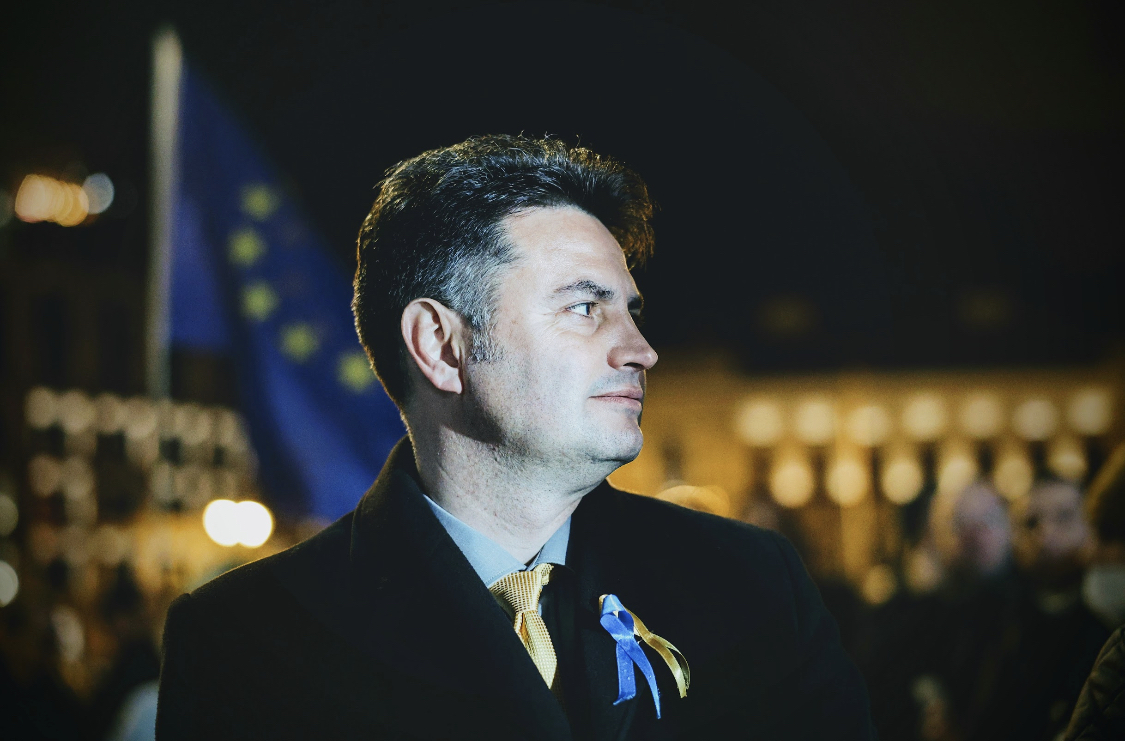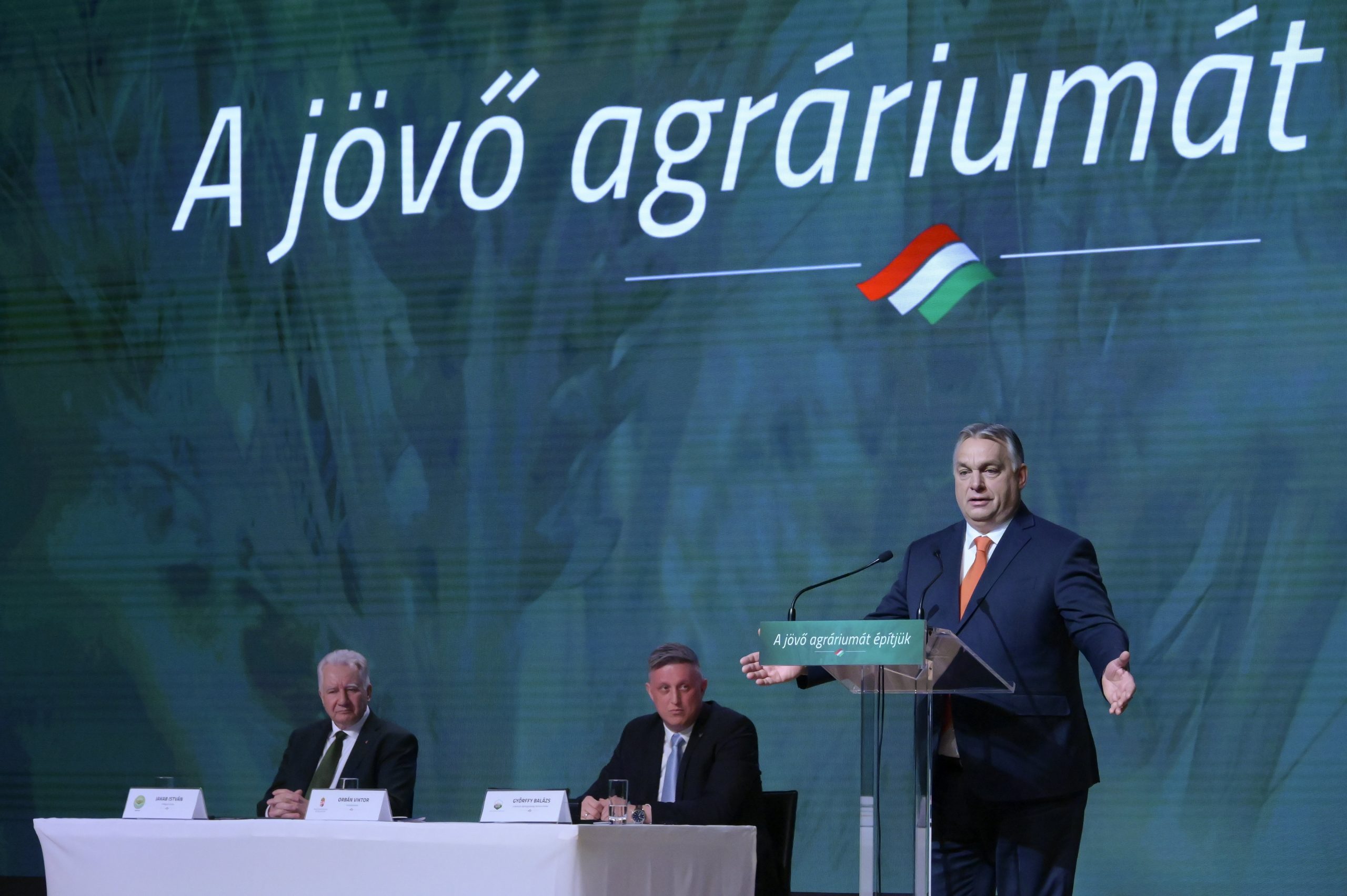
The opposition alliance accused Orbán of "trying to live up to the vileness of his role model ... Putin."Continue reading

Hungary’s top priority is to stay out of the war between Russia and Ukraine, Prime Minister Viktor Orbán told a congress of farmers’ association Magosz and the National Agricultural Chamber (NAK) on Saturday.
“We condemn war, especially now that it’s taking place in our neighbouring country; we say no to violence, and all of this is important, but the most important thing is for Hungary to stay out of this armed conflict,” the prime minister said.
Orbán said all wars could be examined from several different perspectives, and should be, but only one perspective mattered when it came to making decisions. “We can only look at it through one kind of glasses: the Hungarian kind,” he said.
He said the government had “taken no wrong steps” over the past several days and would not do so in the coming weeks either, because “we’ll be able to remain calm even in the most difficult moments”. “We won’t change our perspective on war for any other kind of foreign perspective recommended from abroad.”
The prime minister said it was important for the government to continue making decisions in the months ahead that would prevent “Hungarians paying the price of war”.
Hungary’s open trade and investment regime means that its interests lie in a free and open world which has now been made more difficult because of war, Orbán said. This means that Hungary’s entire foreign trade strategy needs to be adjusted to the current situation, which the government will do in the coming days, he added.
“It’s not just our hearts but also our pockets that determine our interest in having peace as quickly as possible and regaining a part of our markets that have shrunk due to the war,” Orbán said.
Orbán said the sanctions imposed on Russia were different than the ones imposed in the past because “these will also hurt us.” He said the most important task now was to ensure that the sanctions would not affect the area of energy. “Expensive energy is already a problem, but having no energy is even worse because it brings the economy or at least a certain segment of it to a halt,” he said.
Orbán said that while less than 5 percent of Hungary’s agricultural exports go to Russia and Ukraine, the country’s share of imports made things more difficult, with 7 percent of the country’s raw materials coming from Russia and 8.4 percent from Ukraine.
He said he was discussing the management of this issue with the minister of agriculture, adding that the government would issue a decree in the matter on Saturday.
He noted that rising energy prices also affected goods and raw materials imported from abroad, adding that Hungary also needed to keep an eye on exchange rates. “Since the start of the war in Ukraine, central European currencies have been on a seesaw,” the prime minister said, adding that Hungary could only partly escape the effects of this.
Turning to the election, Orbán said next month’s vote would be a unique one because of the war. The government, he said, had to focus most of its efforts on combatting the negative effects of the conflict. He said Hungary’s banking system was stable and would withstand the pressure.
Orbán said the government had had to formalise its cooperation with NAK and Magosz “because when the left came back into power, it came with a cost to rural Hungary“. He said it was therefore in the farm sector’s fundamental interest to “keep the left far away from agriculture policy” and government.
Orbán said while the output of the agricultural sector had declined by 20 percent and that of the food industry by 16 percent between 2004 and 2010, they had increased by 29 percent between 2010 and 2020, while value added per one hectare of farmland had risen by 45 percent.
Hungary’s farm sector saw the fastest growth in the EU between 2010 and 2021, with its profitability doubling in the period, the prime minister said. Also, while Hungary in 2010 had 40 billion forints (EUR 104,000) to spend on new agricultural machinery, by 2020, it could spend 256 billion, he said, adding agricultural exports last year were up more than 10 percent compared with 2020.
Meanwhile, he said the government was spending more than 600 billion forints on developments as part of its Modern Cities scheme and spending on village development also exceeded 600 billion forints over three years.
Turning to the future, Orbán said farmland had to be under Hungarian ownership.
The prime minister said that the government would increase co-financing for agricultural subsidies from 17.5 percent to 80 percent. This means that counting EU funding and private investment, the agricultural sector will receive a total of 9,000 billion forints in support, he said.
“If this won’t be enough to modernise Hungarian agriculture then nothing will,” Orbán said, adding that “this is the last historic opportunity”. “If we don’t take this opportunity, our competitors will fly past us.”
He said this amount of support should be enough to have 80 percent of the country’s agriculture and food industry under Hungarian ownership. If 20 percent of the food industry is in foreign hands and 80 percent in Hungarian, then it’s possible to have 80 percent of the food that’s consumed be Hungarian, the prime minister added.
Orbán said that in order for rural Hungary to survive, all districts in the countryside must enjoy the same civilizational achievements that are present in cities. Rural Hungary needs proper jobs, good public education and health care, leisure activities, quality roads and internet access. In its agreement with the agricultural organisations, the government has undertaken to ensure that no one should have to commute more than an hour a day to have a European quality of life, he said.
Hungary can and will be “the winner of the future” if it puts its two most important natural resources, farmland and water to good use and builds a self-sufficient economy, Orbán said.
He told the participants of the congress not to “let the city folk talk us out of building Paks II“.
Orbán also talked about the need to preserve the majority Hungarian ownership in Hungary’s banking system and encouraged those in attendance to buy government securities.
As regards the election, the prime minister expressed hope that in the long run political and partisan affiliation would be passed down within families, “so that after some time, one would not have to think about how one votes because they would vote the same way their parents and grandparents had done”.
featured image via Szilárd Koszticsák/MTI